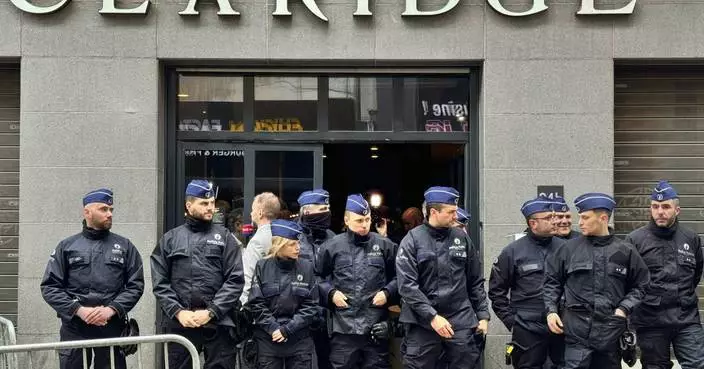U.S. President Donald Trump's demand that European countries take back their citizens fighting in Syria is receiving a mixed reaction, as nations pondered how to bring home-grown Islamic State extremists to trial.
The question of such foreign fighters has been a conundrum for the Europeans for several years. Islamic State prisoners could be exposed to torture or the death penalty if they remain in jail in Syria or Iraq, and the EU opposes the death penalty.
But few European countries have embassies in Syria or Iraq, let alone extradition treaties to get their citizens back. Proving who is who and gathering solid evidence against suspects that would stand up in European courts is virtually impossible. Then there is the question of what to do with the wives and children of European jihadis.

Germany's Foreign Minister Heiko Maas speaks with the media as he arrives to an EU Foreign Ministers meeting at the European Council headquarters in Brussels, Monday, Feb. 18, 2019. US President Donald Trump's demand that European countries take back their nationals fighting in Syria is receiving mixed reactions, as nations pondered how to bring home-grown Islamic State extremists to trial. (AP PhotoFrancisco Seco)
"It is certainly not as easy as they think in America," German Foreign Minister Heiko Maas told reporters Monday at a meeting of EU foreign ministers. "German citizens have the right to return, but we have little ability in Syria at present to check whether German citizens are actually affected."
Maas said authorities would have to "check to what extent they were involved in fighting for IS, which would result in criminal proceedings having to be opened against them."
"These people can come to Germany only if it is ensured that they can immediately be taken into custody," he said.

British Foreign Secretary Jeremy Hunt speaks with the media as he arrives to an EU Foreign Ministers meeting at the European Council headquarters in Brussels, Monday, Feb. 18, 2019. British Foreign Secretary Jeremy Hunt says Brexit talks are entering a crucial final period but that an agreement can be sealed before Britain leaves the European Union on March 29. (AP PhotoFrancisco Seco)
French jihadis made up the largest contingent of European recruits. French officials are concerned because in 2015 and 2016, an Islamic State cell of French and Belgian fighters crossed from Syria into Turkey, eventually launching deadly attacks on Paris and Brussels.
"The last territorial bastions of Daesh (IS) are falling, which doesn't mean that the action of Daesh is finished. On the contrary," said French Foreign Minister Jean-Yves Le Drian.
Britain refuses to take back citizens who joined IS and has stripped them of their citizenship. Belgium has said previously that it would not make any great effort to secure the release of 12 citizens imprisoned in Syria and two in Iraq.
Other European countries have remained largely silent about the fate of men and women whom many see as a security threat.
Hungarian Foreign Minister Peter Szijjarto said the issue is "one of the greatest challenges ahead of us for the upcoming months."
"Our major endeavor now should be not to allow them to come back to Europe," said Szijjarto, whose staunchly anti-migrant government has linked extremist attacks to migration.
But Slovakian Foreign Minister Miroslav Lajcak, also part of an anti-migrant government, said "I would certainly be in favor" of Europe taking foreign fighters back.
"There is clearly a need to define ... the European position on this issue," Lajcak told reporters.
"Whether we like or dislike the U.S. position, they make no secret of it. It's very clear," he said. "This is the key partnership for the European Union. But the rules of this partnership have changed and we need to be able to react to it."
WARSAW, Poland (AP) — Polish Prime Minister Donald Tusk expressed satisfaction on Monday after a series of candidates supported by his party won weekend races for mayor.
Candidates from his pro-European Union centrist Civic Coalition, or running with the party's backing, won in a series of cities in the second round of local elections held on Sunday, among them Krakow, Poznan, Wroclaw and Rzeszow.
“It is very difficult to clearly say who won and who lost,” Tusk said Monday. “But if we compare these results, especially in the most attractive places, on these attractive battlefields ... then I actually have reasons for satisfaction.”
“Law and Justice has simply disappeared in many places,” Tusk added at a news conference, referring to the main opposition party.
The results put Civic Coalition in a favorable position as the country looks next to elections to the European Parliament on June 9.
Mayors were chosen in a total of 748 cities and towns where no single candidate won at least 50% of the vote during the first round on April 7.
Candidates for Tusk’s party also recaptured cities where they had not held power for many years, including Zielona Gora, Legnica and Torun.
The local and regional elections were viewed as a test for Tusk's pro-European Union government four months after it took power at the national level. Sunday's second round strengthened the Tusk government's leverage in the cities, which should facilitate cooperation on development projects and allotment of EU funds.
Tusk's allies also won in some places in the first round two weeks ago, including in Warsaw, where incumbent Mayor Rafal Trzaskowski was an easy victor.
In the first round, the right-wing Law and Justice, prevailed on the level of regional assemblies in the country's 16 provinces, where it took 34.3% of the votes, while Tusk's Civic Coalition got 30.6%. Law and Justice governed on the national level from 2015-23.
Tusk’s socially liberal Civic Coalition traditionally has strong support in cities, while Law and Justice has a more solid base in conservative rural areas, particularly in eastern Poland.
Civic Coalition is the largest group in a three-party coalition that governs the EU nation of 38 million people. The coalition is pro-European Union but otherwise spans a wide ideological spectrum with left-wing politicians in the Left party as well as conservatives in the Third Way.
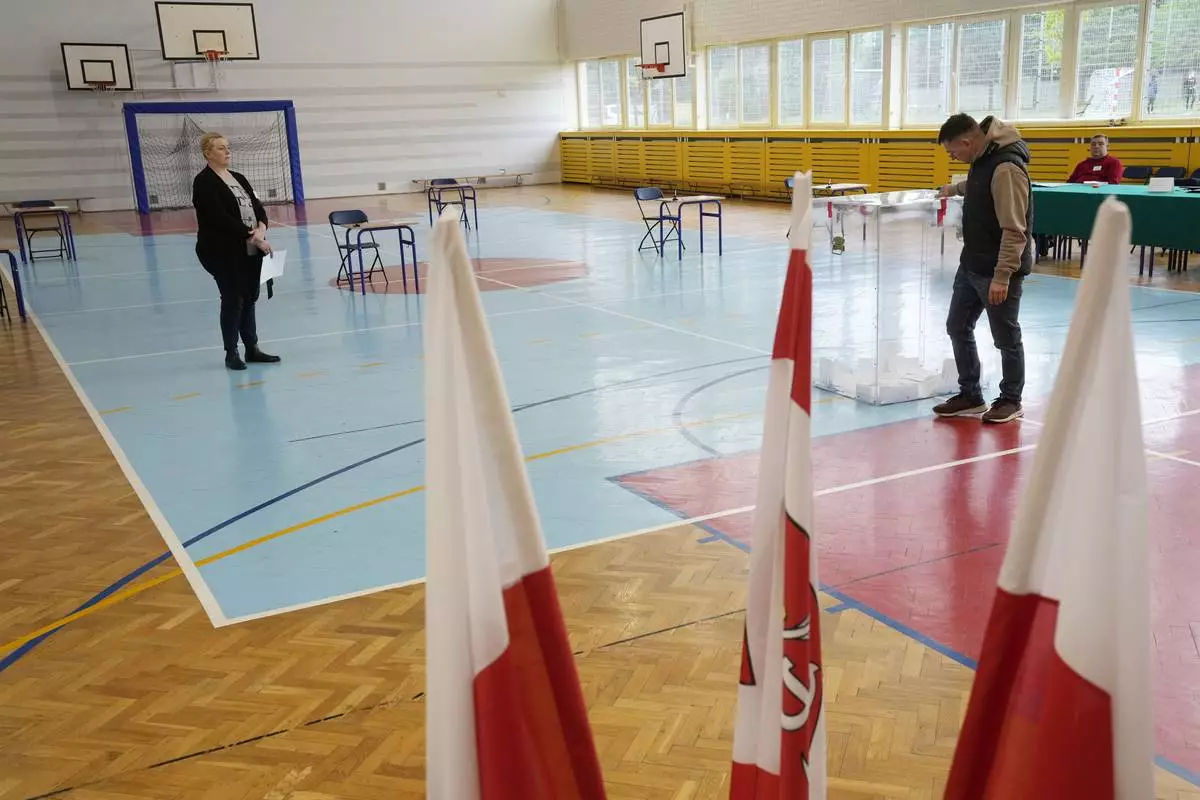
Polish voters take part in a local runoff election in Lomianki, near Warsaw, Poland on Sunday, April 21, 2024. Voters are choosing mayors who did not win outright in the first round of the election two weeks earlier. (AP Photo/Czarek Sokolowski)
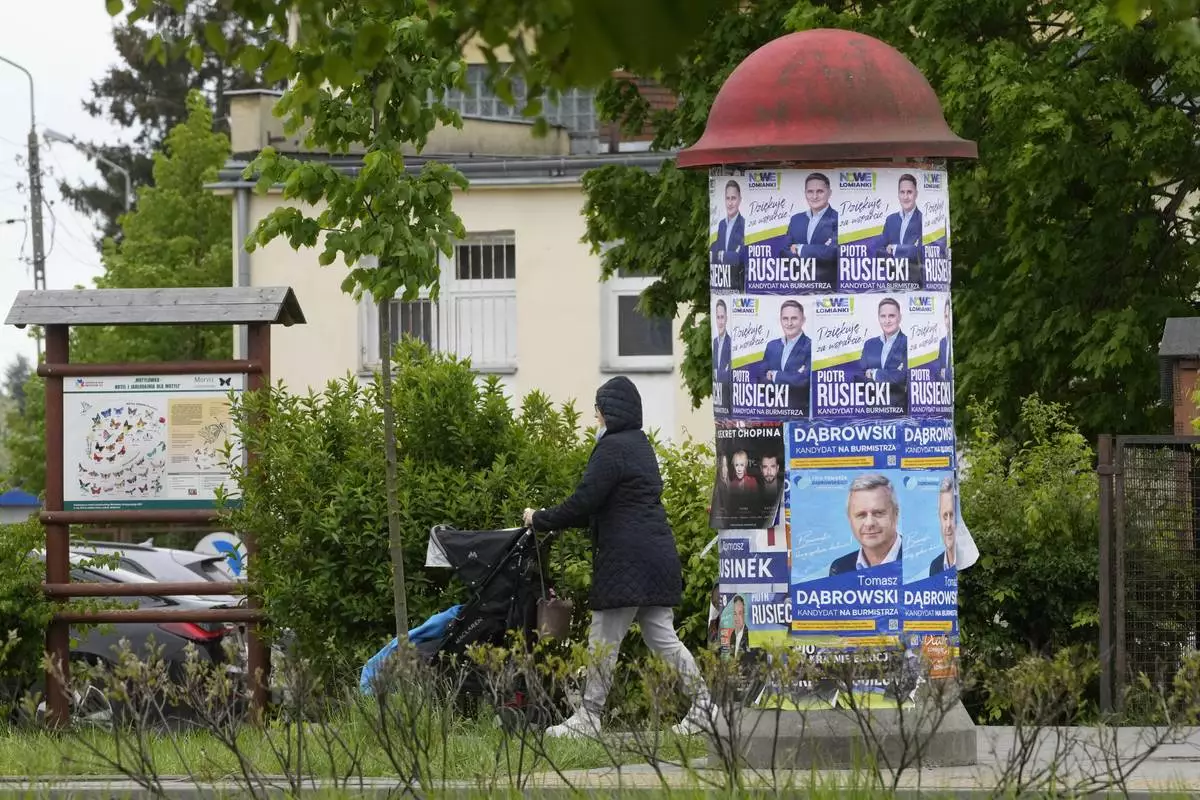
Campaign posters promote candidates as Poles vote in local and regional elections in Lomianki, near Warsaw, Poland on Sunday, April 21, 2024. Voters are choosing mayors who did not win outright in the first round of the election two weeks earlier. (AP Photo/Czarek Sokolowski)
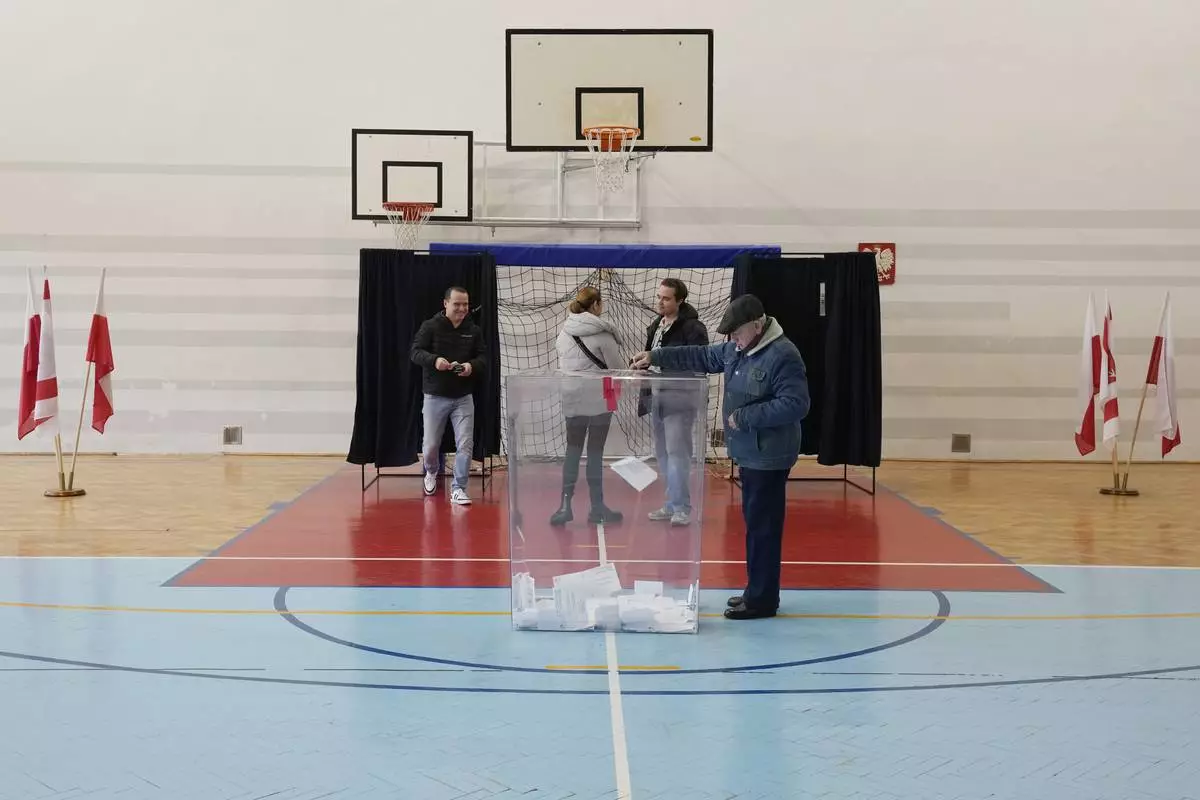
Polish voters take part in a local runoff election in Lomianki, near Warsaw, Poland on Sunday, April 21, 2024. Voters are choosing mayors who did not win outright in the first round of the election two weeks earlier. (AP Photo/Czarek Sokolowski)

Polish voters take part in a local runoff election in Lomianki, near Warsaw, Poland on Sunday, April 21, 2024. Voters are choosing mayors who did not win outright in the first round of the election two weeks earlier. (AP Photo/Czarek Sokolowski)
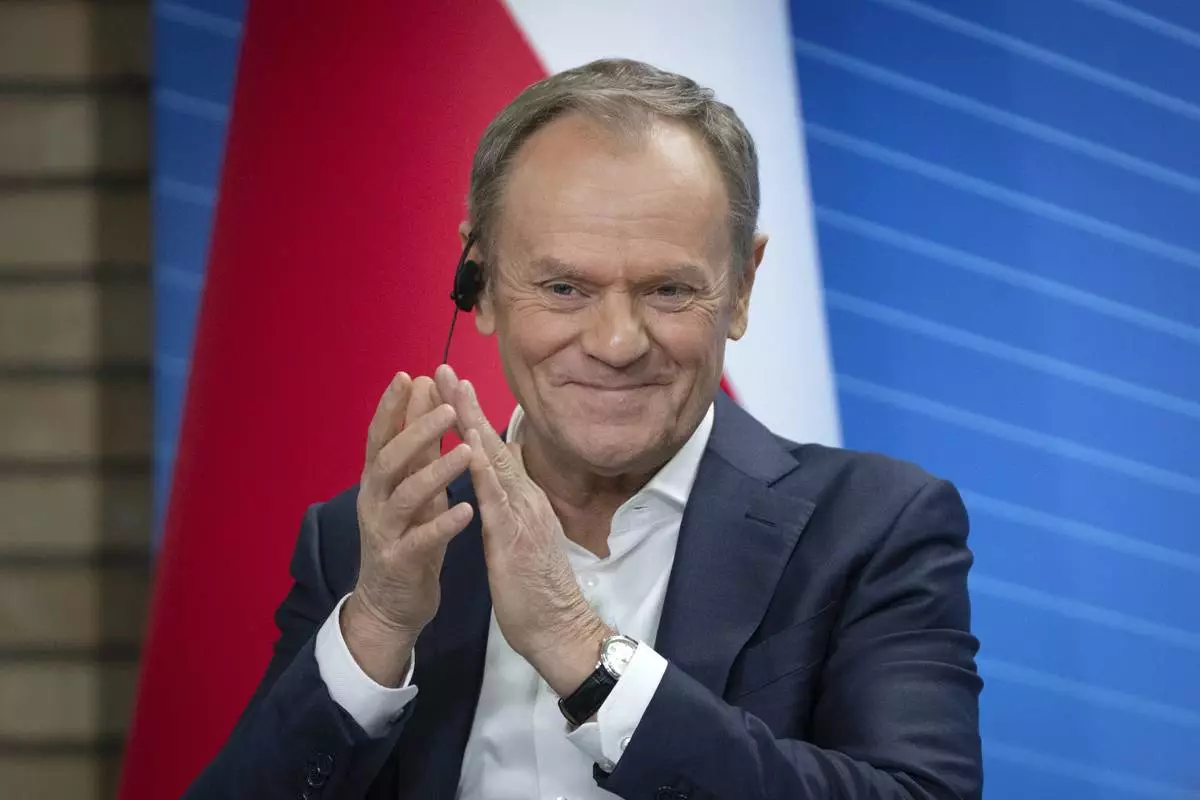
FILE - Poland's Prime Minister Donald Tusk reacts during his and Ukrainian President Volodymyr Zelenskyy meeting with students in Kyiv, Ukraine, Monday, Jan. 22, 2024. Poland's Prime Minister Donald Tusk is celebrating a victory on Monday April 22, 2024 after a series of candidates supported by his party won weekend races for mayor. (AP Photo/Efrem Lukatsky, File)
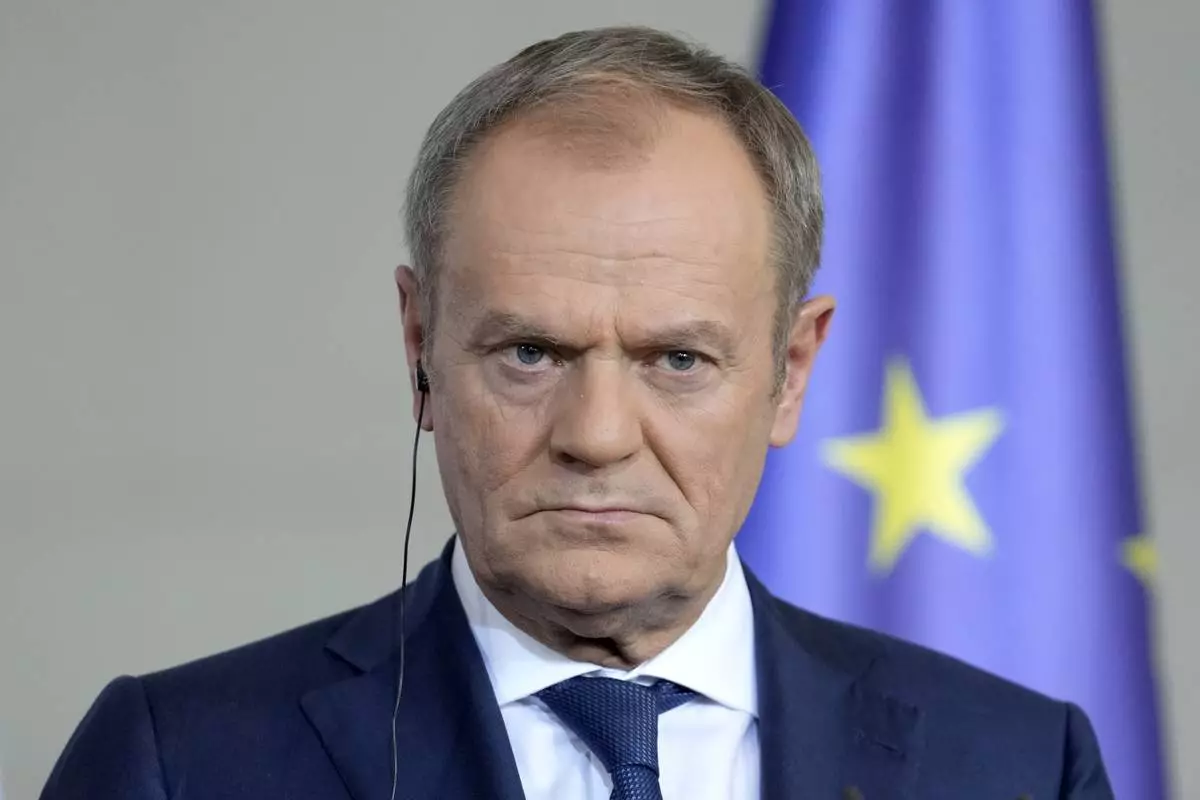
FILE - Poland's Prime Minister Donald Tusk listens to the media in Berlin, Germany, Friday, March 15, 2024. Tusk is celebrating a victory on Monday April 22, 2024 after a series of candidates supported by his party won weekend races for mayor. (AP Photo/Ebrahim Noroozi, File)

















